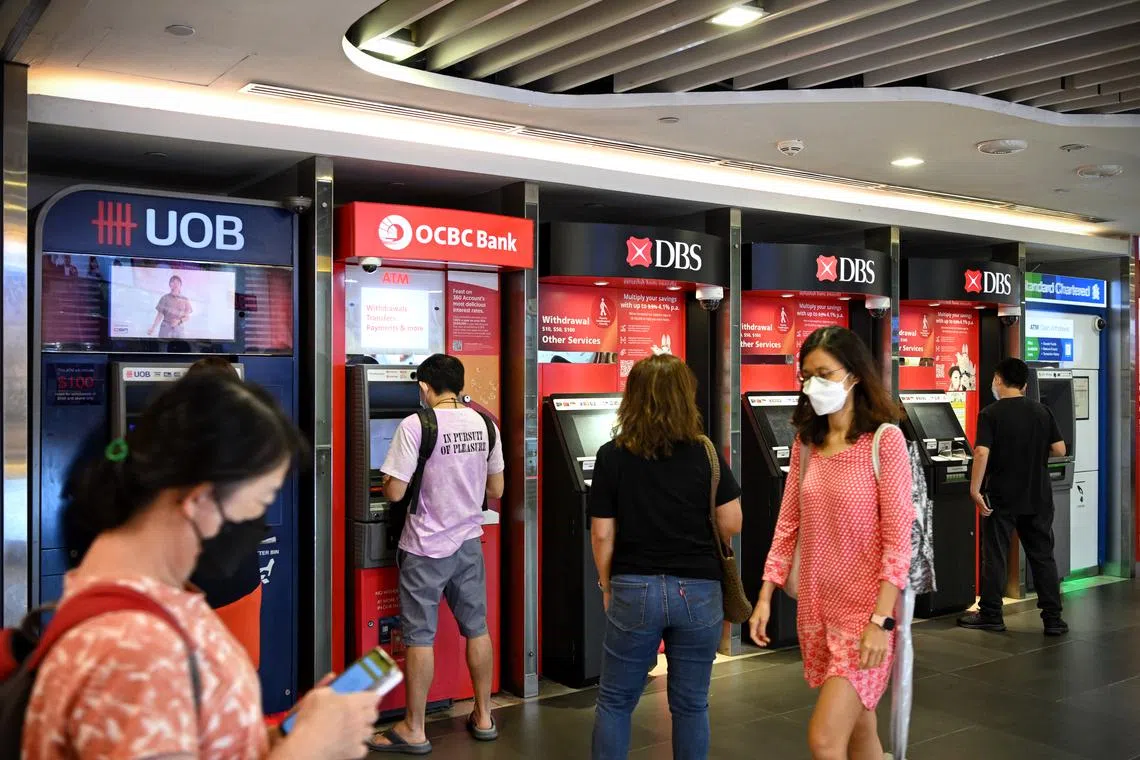Banks to share information voluntarily in initial phase of proposed platform to fight money laundering
Sign up now: Get ST's newsletters delivered to your inbox

The six banks – DBS, OCBC, UOB, Standard Chartered, Citibank and HSBC – will be first to use Cosmic.
PHOTO: ST FILE
Follow topic:
SINGAPORE – Banks that agree to share details of customers suspected of money laundering on a proposed digital platform will be allowed to do so voluntarily in its initial phase.
This will give them time to get familiar with using the Collaborative Sharing of Money Laundering/Terrorism Financing Information and Cases (Cosmic) platform.
The Monetary Authority of Singapore (MAS) said the platform will also need time to reach operational stability.
A Bill to amend the Financial Services and Markets Act to set up Cosmic and set out rules governing its initial phase was put up for first reading in Parliament by Minister of State for Trade and Industry Alvin Tan on Monday.
“During this voluntary phase, MAS will be closely engaging the participant financial institutions to understand and address any operational concerns, and make adjustments to the platform or requirements, as necessary,” the authority said in response to queries from The Straits Times.
MAS earlier said, in a brief released on Monday, that it plans to make some aspects of information sharing mandatory and progressively extend Cosmic’s coverage to more areas and financial institutions in subsequent phases.
Jointly developed by MAS and six major banks in Singapore, Cosmic will allow enrolled institutions to request and share information on customers whose banking habits raise multiple red flags pointing to possible criminal activities.
The six banks – DBS, OCBC, UOB, Standard Chartered, Citibank and HSBC – will be the first to use Cosmic, which aims to thwart financial criminals who avoid detection through an ever-shifting web of accounts.
Cosmic will operate alongside existing requirements for all financial institutions to have robust controls to detect and prevent suspicious activity, as well as report such activity to the Suspicious Transaction Reporting Office of the Commercial Affairs Department (CAD), said MAS.
The proposed platform will initially focus on three key risks in commercial banking: abuse of shell companies; misuse of trade finance for illicit purposes; and financing that supports the proliferation of weapons of mass destruction.
In a consultation paper issued in October 2021 on Cosmic, these areas were identified as priority targets, in line with Singapore’s national strategy to fight serious financial crime.
The thresholds and red flags for suspicious banking behaviour will be based on past global and domestic cases in the key risk areas, but will remain confidential to prevent tipping off offenders.
The red flags could include signs of a fictitious company profile, financial transactions without a clear economic purpose such as “round tripping” funds back to the sender, inconsistent replies to queries, or seemingly unrelated companies that actually have the same beneficial owners doing business with each other.
The thresholds will be adjusted over time as criminals’ methods evolve, MAS said in the consultation paper.
The six banks have said the new platform lets them collaborate on detecting illicit activity quicker and help preserve Singapore’s position as a global financial centre.
“DBS is currently integrating its technology platform and operational processes with Cosmic, and is excited with the new capability to improve – in a very controlled way – information sharing between banks, regulators and law enforcement,” said Mr Lam Chee Kin, managing director and head of legal and compliance at DBS.
Sophisticated criminals use a variety of ways to conceal information to and between banks to impair investigations, and no single bank can unravel the whole scheme, he added. “So Cosmic, in facilitating controlled information sharing, helps to mitigate one of the weapons the criminal has.”
A Standard Chartered spokesman said Cosmic and the regulatory framework enabling it will serve as an important platform to strengthen the financial crime detection capabilities of all industry players here.
“Together, financial institutions can collaborate and share information on specific transactions, and support MAS and CAD to detect and intervene in illicit networks operating in the financial system and more effectively combat financial crimes.”

